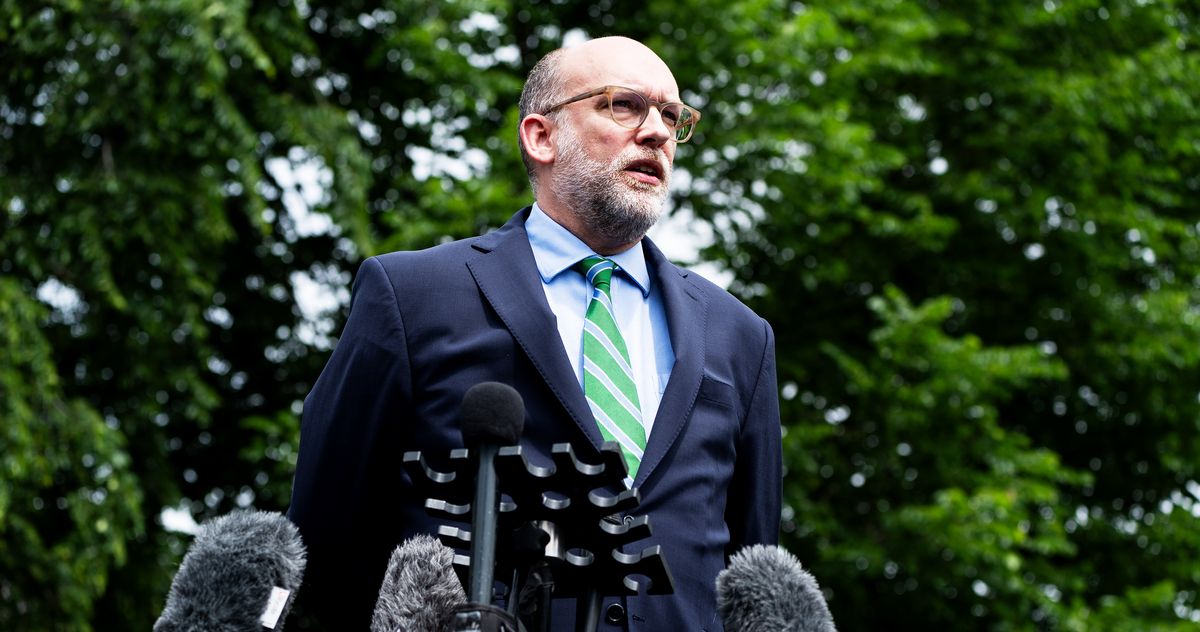
Democrats are scrambling for a lifeline after Vice President Kamala Harris’s resounding 2024 loss to President Donald J. Trump, and their latest answer—an ambitious manifesto dubbed “Project 2029”—is already drawing comparisons to and, critics say, outright imitation of the Heritage Foundation’s Project 2025.
The new initiative, organized by former speechwriter Andrei Cherny and unveiled in the pages of The New York Times, seeks to reboot a party still reeling from its third consecutive presidential defeat by producing quarterly policy blueprints, convening public conferences, and ultimately releasing a book that Democratic hopefuls can brandish on the 2028 campaign trail.
Yet among Republicans and seasoned political observers, Project 2029 looks less like a bold original vision than a frantic act of mimicry—an admission that Democrats have spent the last decade lambasting conservative ideas while failing to market coherent alternatives of their own.
Cherny candidly told the Times that Democrats “can’t beat something with nothing,” conceding what conservatives have argued all along: that the left’s 2024 campaign revolved around demonizing Trump’s proposals while sidestepping the glaring rifts between progressive and establishment factions.
It is a truth borne out at the polls, where Harris hemorrhaged moderate suburbanites in the Rust Belt and failed to energize key blocs of minority voters who spurned a Democratic platform more preoccupied with identity politics and climate mandates than with prosperity, public safety, or border security.
Project 2029 promises to tackle national security, the economy, and education policy. Yet the makeup of Cherny’s “Avengers of public policy” reveals something else entirely—an echo chamber of Biden, Schumer, and Clinton alumni whose track record includes spiraling inflation, a disastrous withdrawal from Afghanistan, school lockdowns that set back an entire generation, and record-shattering federal deficits.
Take Neera Tanden, for instance, who now chairs the Center for American Progress and recently found herself testifying before House Oversight about President Biden’s cognitive fitness.
Or Jake Sullivan, Biden’s National Security Advisor and a chief architect of the Afghanistan exit that cost thirteen American heroes their lives. Add Anne-Marie Slaughter, a champion of “global governance,” and Jim Kessler of Third Way, known chiefly for crafting gun-control bills that alienated rural and blue-collar Democrats.

Together they form the very establishment that grassroots progressives deride as corporate, yet they also champion the same policies that alienate Main Street voters and drive them toward Trump’s America-First coalition.
Inside Republican circles, the view is blunt: Project 2029 is a belated tribute to the strategic discipline conservatives have already mastered. When the Heritage Foundation rolled out Project 2025, it presented a clear road map for dismantling the administrative state, securing the border, restoring American energy dominance, and re-anchoring U.S. foreign policy in strength through peace.
By contrast, Project 2029 surfaces as an exercise in political damage control—an acknowledgment that Democrats entered the last election bereft of a narrative, let alone viable solutions, for rising crime, surging energy prices, and the unprecedented fiscal hole left by their own spending bills.
Cherny’s vow to publish quarterly proposals underscores a deeper crisis. With House Republicans advancing Trump’s One Big Beautiful Bill—a sweeping package of tax relief, deregulation, and deficit reduction—Democrats now face the stark reality that the GOP is not merely steering the agenda; it is transforming it.
Inflation has finally begun to cool under Trump’s energy and tariff policies, and wages are rising after fresh incentives for manufacturing. Approval for the Trump-led border crackdown is hovering near record highs.
And America’s overseas posture has regained credibility, from Tehran to the South China Sea, after the administration’s decisive use of targeted force. Against that backdrop, Project 2029’s authors are left to re-brand progressive orthodoxy as centrist pragmatism—no simple feat when their roster includes operatives synonymous with the very excesses that have soured swing voters on the Democratic brand.
Even inside the party, skepticism is mounting. Pollster Celinda Lake warned the Times that Democrats “lacked a functioning narrative,” not bullet-point policy white papers.
Strategist Adam Jentleson added that any attempt to placate every special-interest silo would fall prey to the same “interest-group Borg” that has paralyzed previous Democratic Congresses.

His remark cuts to the heart of the matter: Project 2029 is poised to become a tug-of-war between climate activists, union bosses, social-justice lobbyists, and Wall Street donors, each intent on imprinting their preferred spending spree or regulatory regime onto the final product.
By the time the compromises are stitched together, voters will be left with either an incoherent mélange or a watered-down sequel to Bidenomics—and likely both.
Republicans, meanwhile, see an opening. With the Heritage blueprint already feeding into Trump’s second-term hiring pipeline—from agency transition teams to a pre-vetted shortlist of constitutionalist judges—conservatives are ready to govern on day one of 2029, not just campaign.
The policy gulf is not narrowing; it is widening beneath Democrats’ feet. While Project 2029 workshops how to pitch carbon taxes in Iowa or reparations schemes in Ohio, Republicans are rolling out tangible wins: energy permits fast-tracked in West Virginia, fentanyl traffickers captured at a fortified southern border, apprenticeship programs booming in the upper Midwest. The contrast couldn’t be starker.
But perhaps the most glaring flaw in Project 2029 is its reliance on the very figures who presided over the party’s decline. Neera Tanden’s aborted OMB nomination imploded amid a trail of incendiary tweets attacking everyone from Bernie Sanders to center-right moderates.
Jake Sullivan has spent years defending an Afghanistan debacle that left allies scrambling and emboldened America’s adversaries. Anne-Marie Slaughter remains best known for academic treatises extolling transnational governance—hardly a Midwestern vote-getter when factory towns crave local jobs and secure borders.
Felicia Wong touts “racial equity” frameworks that translate, in practice, into government micromanagement of hiring and lending decisions. Justin Wolfers, an elite economist, once told pandemic-stressed families that stimulus checks were “modestly helpful” while grocery bills soared and small businesses shuttered. If these are the architects of Democrats’ renaissance, Republicans see little reason to fear the sequel.
Pro-Trump strategists believe Project 2029 further cements the narrative that Democrats are trapped in intellectual bankruptcy—capable of attacking Heritage’s Project 2025 in campaign ads but ultimately compelled to emulate its structure when their own cupboard of ideas runs bare.

Even the notion of releasing policy installments over two years mirrors Heritage’s incremental approach, albeit without the grassroots army or policy depth conservatives have cultivated since the Reagan era.
And the timing of Cherny’s initiative—announced just months after a historic GOP budget victory—signals desperation more than innovation. Democratic donors are demanding a product, any product, that looks serious enough to reassure Wall Street while still appeasing campus activists.
The GOP is poised to exploit these fissures. House Speaker Mike Johnson has already floated a “Policy Olympics” in which Republicans will publicly compare provisions of the One Big Beautiful Bill with each forthcoming Project 2029 installment, daring Democrats to defend carbon caps over energy independence and race-based debt forgiveness over merit-based job training.
Senate Majority Leader John Thune is drafting a series of prime-time committee hearings highlighting the difference between Trump’s low-tax growth agenda and the left’s regulatory labyrinth.
“Let’s have transparency,” one senior aide quipped. “If Democrats believe in a Green New Deal for your lawnmower and a social-credit score for your mortgage, we’ll give them the microphone—then hand voters the bill.”
All the while, Trump’s political machine is turning Project 2029 into a rhetorical punching bag. On Truth Social the president has already branded Cherny’s blueprint “Project Prequel” and suggested Democrats could save time by simply reprinting the Biden platform in smaller type.
Campaign surrogates in Pennsylvania, Georgia, and Arizona are hammering home the message that Democrats refused to craft policy when they held the White House, only to discover a grand vision once voters showed them the door. This, Republicans argue, underscores a party that governs by polling memo and focus group, not conviction.
Even moderate Democrats acknowledge the optics are poor. Several House incumbents privately confess that Project 2029 could devolve into an academic exercise divorced from retail politics.
“Our problem isn’t a lack of white papers,” one Midwestern Democrat told an off-record gathering of centrist donors. “It’s that parents can’t afford groceries or feel safe walking downtown. They know who’s fighting for them, and right now that’s Donald Trump.” Another Democrat fretted that highly paid think-tankers lecturing voters on equity and decarbonization could spell disaster in districts already flirting with GOP representation.
Indeed, the initial backlash underscores how badly Democrats misdiagnosed their 2024 drubbing. While they fixate on crafting the perfect tax credit for electric bicycles, Trump and congressional Republicans are closing the loop on border walls, fentanyl interdiction, and energy prices—all kitchen-table issues that resonate far beyond Beltway salons.
The party that once prided itself on speaking for the working class now risks posterity as the party of PowerPoint prescriptions that never materialize into paychecks.
Republicans view this as validation of Trump’s governing philosophy: clarity, accountability, and tangible results. Where Heritage’s Project 2025 supplies a modular instruction manual—how to claw back regulatory overreach, how to fortify Title 42, how to re-shore strategic industries—Project 2029 aspires to reconcile a progressive wish list with donor-class sensibilities, a balancing act that has repeatedly collapsed under electoral pressure.
With the GOP ascendant, the stakes for 2026 and 2028 are crystal clear. Democrats must prove they can craft, not merely critique, a realistic governing vision.
Yet by stocking their board with the very names voters associate with foreign-policy blunders, economic malaise, and cultural condescension, they risk reminding the electorate why Trump’s unapologetic patriotism and main-street populism keep winning converts.
For Republicans, the message is simple: Project 2029 is déjà vu—an elite echo chamber repackaging old policies under a new banner, while heartland families continue rallying behind the movement that champions secure borders, affordable energy, and homegrown opportunity.
As Cherny’s Avengers head to their first policy conference, President Trump’s America barrels ahead with record job creation, manufacturing revival, and a renewed spirit of constitutional liberty.

Project 2029 may fill op-ed pages, but on the ground, voters are increasingly siding with the party that delivers measurable progress. Republicans are ready—and, they contend, Democrats are still searching for a script.




